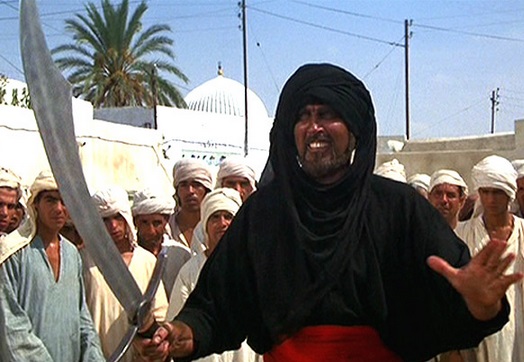  |
 |
 |
 |
|
MahdiWatch.org
|
 |
|
Home | About Me | Links to My Articles | Info on My Books | Contact Me
|
 |
|
Welcome to MahdiWatch.org! NEWSFLASH! COMMENTS LINK
BELOW EACH POST IS ENABLED! FEEL FREE TO BURY ME, PRAISE ME--OR JUST ISSUE A PERSONAL FATWA!
al-Mahdi is "the rightly-guided one" who, according to Islamic Hadiths (traditions),
will come before the end of time to make the entire world Muslim. Over the last 1400 years numerous claimants to the
mantle of the Mahdi have arisen in both Shi`i and Sunni circles. Modern belief in the coming of the Mahdi has
manifested most famously in the 1979 al-`Utaybi uprising of Sa`udi Arabia, and more recently in the ongoing
Mahdist movements (some violent) in Iraq, as well as in the frequently-expressed public prayers of former Iranian
President Ahmadinezhad bidding the Mahdi to return and, in the larger Sunni Islamic world, by claims that Usamah bin Ladin
might be the (occulted) Mahdi. Now in 2014 Mahdism is active in Syria, as the jihadist opposition group Jabhat al-Nusra
claims to be fighting to prepare the way for his coming; and in the new "Islamic State/caliphate" spanning
Syrian and Iraqi territory, as its leadership promotes the upcoming apocalyptic battle with the West at Dabiq, Syria. This site will track such Mahdi-related movements, aspirations, propaganda and beliefs in both Sunni and Shi`i
milieus, as well as other Muslim eschatological yearnings.
For a primer
on Mahdism, see my 2005 article, "What's Worse than Violent Jihadists?," at the History News Network: http://hnn.us/articles/13146.html; for more in-depth info, see the links here to my other writings, including my book on Mahdism.
|
|
|
|
Wednesday, June 26, 2013
The Rule of Three and the Mahdi
Since today is the (alleged) 1,145th birthday of Muhammad “al-Mahdi,” the (allegedly) occulted-but-not-dead-yet 12th Imam of Shi`ism, it seems a good time to comment on several recent stories about
the Mahdi from Shi`i, Sunni and Sufi sources. First, the newly-elected
President of the Islamic Republic of Iran—where the official religion, recall, is Twelver Shi`ism—thanked the Imam-i Zaman, “Imam of the Age,” for his “epic” electoral victory. While
this is interesting, most notably in demonstrating that Hassan Rouhani’s Twelver Shi`i credentials
and belief in Mahdism differ very little, if at all, from those of outgoing President Mahmud Ahmadinejad, it is in no wise
exceptional—ignorant hyperventilating claiming otherwise notwithstanding. Belief in the return
of the “Boy Wonder” Muhammad (died, but claimed occulted in the 9th c. AD) as the eschatological Mahdi is THE
key belief of the largest branch of Shi`ism. (However, it’s no more remarkable in those circles than
Tim Tebow or George Bush or any of the world’s other 2.2 billion Christians speaking of Jesus’ Second Coming,
and/or thanking him for beating the Steelers or John Kerry.) Ahmadinejad simply seems to think the Mahdi’s
return will be sooner, whereas Rouhani would opt for a later one, sometime in the unspecified future. An
Iranian government spokesman's statement yesterday (June 24, 2013) that Ahmadinejad might return with the Imam to “work for the establishment of pure Islam” is agitating certain eschatological embellishers; but far from elevating Iran’s outgoing President to the right hand of the Mahdi, it
is even more likely that such a claim amounts to the establishment damning the cleric-baiter Ahmadinejad with faint praise—or
mockery. Rouhani does appear moderate, or at least grounded in reality, next to Iranian Major General Muhammad Hassan Nami,
who just prior to the Iranian election declared that he had procured both a picture and a voice recording of the Awaited Mahdi—neither of which has yet seen the
light of day, alas.
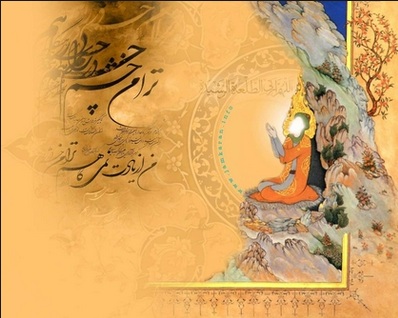
The Mahdi has more lens flare than a J.J. Abrams movie.
But as I’ve commented many times in recent years, Mahdism is not only—or
even primarily, these days—the province of the Twelver Shi`is. The Sunni world has a number of proponents
of Mahdist da`wah (“propaganda” or “summons”), most notably the Turk Adnan Oktar who uses
the pseudonym “Harun Yayha.” (I went to Istanbul in 2008 and interviewed Oktar about Mahdism and several other topics, especially his Islamic Creationism.) Recently, Oktar did a TV clip entitled “If Obama Supports the System of Mahdi, the Islamic World Will Attain Peace.”
(No date is given for the spot, but it would appear to be from May, 2013, when Turkish Prime Minister Erdoğan was meeting with President Obama in Washingon, DC.) Oktar, doing his best Robert Palmer impression (surrounded by a bevy of attractive, expressionless women), waxed eloquent about the need for not just the Islamic but the
Christian world to accept the Mahdi, beginning with Barack Husayn Obama. Only in this way, Oktar opined,
can peace come not just to stricken Syria but the persecuted Muslim world in its entirety. He also called
on the Organization of Islamic Cooperation to “take Mahdism seriously” and accused (presumably American)
Evangelicals of being pleased with attacks on Muslims, even claiming that a prominent (but unnamed) Evangelical Christian
leader said that “this is what we want.” Oktar’s followers seem to believe that he is
the Mahdi—while critics accuse him of heading a “sex cult.” (Of course, Mahdism and sex are not necessarily mutually exclusive.)
Perhaps Obama would make a better Mahdi than Oktar–assuming he is really out of
a job on January 20, 2017.
The last recent Mahdi news comes from the world
of the Sufis, or Islamic mystics—no surprise, really, since as I pointed out in my book Holiest Wars many Mahdist movements have arisen from Sufi contexts (owing both to Sufism’s penchant for charismatic leadership,
and its orders constituting ready-made battalions of potential jihadists). Just over a week ago a long
disquisition was published by the Naqshbandi-Haqqani Sufi order, entitled “The Appearances of Mahdi (AS) and the Sohbets of Sheykh Effendi
Concering His Arrival.” (A sohbet is, in the original Persian, a “conversation.”)
“Sheykh Effendi” was Abd al-Karim al-Kibrisi who died in 2012; he was the number two
man in the Naqshband-Haqqani order, behind Shaykh Muhammad Nazim al-Haqqani, based in Cyprus and still going strong at age
91. Abd al-Karim, much like his master, seems to have had a predilection for prognosticating about
when the Mahdi would arrive—and being wrong. So Hoca Lokman Efendi, the new number two man in this Sufi order, wrote to allay concerns about the coming of the
Mahdi. He pointed out that being obsessed with the eschatological end of the world (which
will come after the Mahdi) should not overshadow one’s personal concern with his own life’s
end. Also, the Dajjal will come before the Mahdi, but few seem concerned with determining when that will
be. Lokman also blasts the Wahhabis of Saudi Arabia as one of the “two horns of Sheytan [Satan]”—and,
for good measure, theorizes that the sect’s founder, Ibn Abd al-Wahhab (d. 1792), was descended from some of the Jews of Medina who refused to accept Muhammad as
a prophet and moved to al-Najd region. The other satanic projection, according to this Sufi leader, is
the al-Sa`ud tribe, which accepted Wahhabi Islam and took over the Arabian peninsula with British help and also somehow, against all historical evidence, “brought down the [Ottoman]
caliphate.” And since there is no longer a political caliphate, Muslims must prepare
for the arrival of the Mahdi, says Lokman, “by cleaning ourselves up, by accepting the Shariat [shari`a] and putting
the Shariat into our lives, personal shariat…because there is no Khilafah [caliphate].”
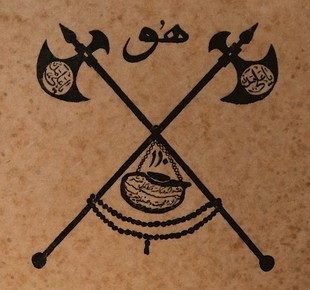
The official, centuries-old symbol of the Naqshbandi Sufi order. Who needs a sword or a bow when you have those axes?
Bottom-line: Within the past month, yearnings for the Mahdi have been expressed not only
in the world’s largest Shi`i Muslim country (Iran) but also in one of its most populous Sunni ones (and center of the
largest Islamic empire ever to exist: Turkey); furthermore, one of the Islamic world’s most significant transnational
and non-state actors, the Naqshbandi-Haqqani Sufi order, actively promotes preparing the way for the Mahdi.
This is yet more anecdotal data to support the empirical evidence garnered by Pew last year which demonstates that Mahdism, far from being an outlier Muslim belief, has
become mainstream and pan-sectarian. And Mahdism, like many other facets of life, appears amenable to the "rule of three."
1:16 am edt
Sunday, June 16, 2013
Rouhani May Not Go to Extremes, But He's Hardly "Moderate"
The journalistic mob has spoken: the newly-elected President of the Islamic Republic of Iran, Hasan Rouhani, is a "moderate"
(so says CNN, "WaPo," Globalpost, MSNBC, alArabiya, "The Guardian," and virtually every other news outlet in this quadrant of the galaxy; in fact I think Walter Cronkite has chimed in
agreement from his post-mortal coil state). But precious little corroboration of this adjective is adduced in any of
these fawning articles, besides Rouhani's vague talk of "reforms" and "greater personal liberty."
So great is the media's hatred for outgoing President Mahmud Ahmadinejad that journalistic groupthink has coalesced, almost
instantaneously, around the trope that Rouhani must be an improvement.
But is he? First off, Dr. Hasan Rouhani
(who may or may not have a doctorate from Glasgow Caledonian University), is a Twelver Shi`i cleric--a mujtahid, a "reinterpreter" of Islamic law--albeit of lesser rank than
than an ayatollah). Ahmadinejad, on the contrary, was a layman. Furthermore, Rouhani's biography clearly shows that he was one of Khoneini's first supporters and, to this day, has never disputed the vilayet-i faqih ("rule of the [Islamic] jurisprudents") set up in 1979--in fact, of course, no man could be elected to any
post above dog catcher in Iran without manifesting unwavering support for that system. Rouhani's former role as chief
nuclear obfuscator, er, negotiator vis-a-vis the Europeans is also adduced as evidence of his "moderation" when,
in fact, it simply proves his canniness in pulling the suf (wool) over diplomacy-needy European eyes. His ability
to speak English, which of course also sets him apart from that eschatological rube Ahmadinejad, is taken as evidence of cosmopolitanism
and flexibility--by gullible foreign ministry and US State Departmen apparatchiks. Rouhani's (allegedly) published works
include multivolume sets on Islamic political thought and monographs on fiqh (Islamic jurisprudence), shari`a,
Khomeini's political thought and the Shi`a Imams--not exactly grist for reformist mills.
So what gauge, exactly, are
media and analysts using to ascertain Rouhani's "moderation?" Belief in the imminent coming of the Mahdi,
it would seem. Whereas Ahmadinejad often spoke of the 12th Imam al-Mahdi returning in short order to fix the world (by
humbling "Arrogant Powers" led by the US and Israel and establishing global Islamic rule), Rouhani is on record
as having criticized this position--and to journalists almost totally ignorant about Islam in general and Twelver Shi`i eschatology in particular, the enemy
of Ahmadinejad and his apocalyptic arrogance must be our friend. Actually, however, belief in the return of the 12th
Imam is no more an outlier in Twelver Shi`ism than belief in the Second Coming of Jesus is to Christians; it is, rather, a
staple of the faith. Rouhani and Ahmadinejad are both totally in sync on this issue--they just disagree, it seems, on
the timetable. (As for those who claim that Ahmadinejad believes in "hotwiring the apocalypse"--using nukes
against, say, Israel to hasten the Mahdi's coming--they need to read my article refuting that proposition). And Ahmadinejad differed, sometimes publicly, with Ayatollah Khameini--trying to assert his rural-based lay populism over against urban clerical rule. Finally, in
more prosaic terms, Ahmadinejad ran afoul of the senior clerics and the Supreme Leader for contravening the ayatollahs' Islamic
fundamentalist views of male-female relations--kissing his former teacher's hand, for instance; and daring to hold hands with late Hugo Chavez's mother at his funeral. Who's the real moderate, then?
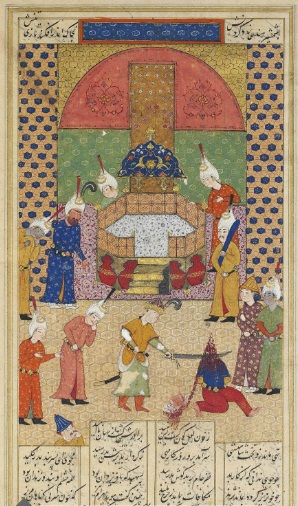
Rouhani may not be Safavid-level bloodthirsty--but the Islamic rule song will remain the
same in Iran.
Friday, June 7, 2013
These Aren't the Mahdists You're Looking For....
A few days ago "Arutz Sheva" ("Israel News") ran an article by Daniel Lev under the headline " PA [Palestinian Authority] Arabs Fete 'New Mahdi,' Establishment of Calpihate" [sic]. It seems those Islamic union ultraists who are crazy for resuscitating the caliphate, collectively organized
as Hizb al-Tahrir [HT] (literally "Party of Liberation"), held a rally in Ramallah, West Bank. According
to Lev, HT "has its own Mahdi candidate--organization leader Ata Abu Rashta, born in Mandatory Palestine and
a long-time resident of a refugee camp near Hevron [Hebron]. Speakers at the rally said that Abu Rashta, as Mahdi, would unify
Muslims and establish Sharia law in countries around the world." Lev also explained, for any Mahdist-savvy ingénues,
that "radical Islamists have been pushing for the reestablishment of the Caliphate--this time to be led by the all-powerful
Mahdi, who will unite all Muslims and establish Islam as the dominant religion in the world, ruling for several years before
the 'Day of Judgment'. Although the identity of the Mahdi is a secret, many Islamists believe that he is alive now, and several
individuals have claimed the title. Many Islamists were said to have believed that Osama Bin-Laden was the Mahdi, or his right-hand
man, until he was killed several years ago by U.S. forces in Afghanistan."
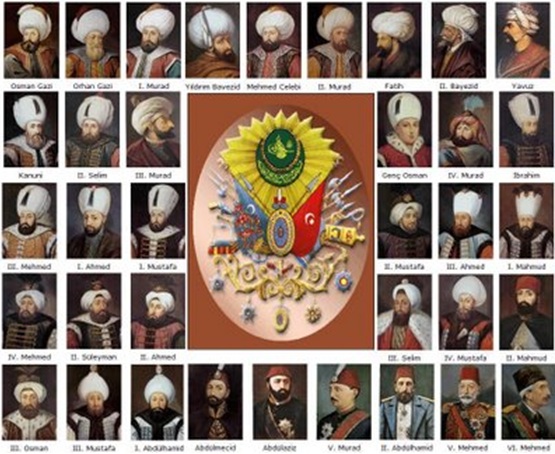
None of these Ottoman Sultans thought himself the Mahdi--even the ones with turbans large enough
to have their own gravitational fields.
Observations:
1) I watched the accompanying video
and while my ability to read Arabic outstrips my capacity to follow it when spoken (especially quickly, as the last interviewee
did), I heard nothing from either HT representative about the Mahdi. The second speaker, Bahir Salih, did refer to Abu Rashta (HT's current leading ideologue) as "Imam," but not as Mahdi.
2) THE eschatological Mahdi would, by
definition, be the Sunni Caliph--since his main task is to create a global Islamic state. Accordingly, all self-styled
mahdis throughout Islamic history (at least all the ones I've studied) have thus also considered themselves to be caliphs.
But very few caliphs have also attempted to claim the mantle of Mahdism. (The returned Twelfth Imam of the Twelver Shi`is
would not be called "caliph" but, rather, "Imam al-Zaman"--Imam of the Age, or another equivalent title.
But HT, remember, is a Sunni group.) Lev wrongly conflates the two registers, Mahdist and Caliphal--whether out of an
attempt to sensationalize the issue, or from ignorance, is unclear.
3) Hizb al-Tahrir has never, in my experience and
research--and I've been to two of their American conferences (the second of which I've written about at length)--articulated any Mahdist ideology or sentiment. It's quite possible, of course, that they tone down the Islamic fervor
of their message here in the US; but, again, that clip from the West Bank evinces no Mahdist claims, as near as I can tell.
4) Mr. Lev is correct that there are currently Islamists who think the Mahdi is extant on earth, although I would take issue
with his claim that "many" believe UBL was he (some did, but not exactly legions). As I pointed out in this article last year, actual polling data indicates that over 40% of the world's Muslims expect the Mahdi to come in their lifetime(s).
Of course, the rub comes when anonymity is sacrificed on the altar of personal Mahdist identification such that, when apocalyptic
push comes to political shove, many fewer Muslims seem willing to recognize any one individual's claim to be him. But
even a low percentage of 1.6 billion can represent enormous numbers of Mahdists in real terms.
5) Note that last line:
UBL was deemed by some "the Mahdi, or his right-hand man" until SEAL Team Six sent him to meet the houris.
The relegation of a potential Mahdi to more of a "John the Baptists" preparer-of-the-way role is a common trope
in Islam, both Sunni and Twelver Shi'i. I saw the latter at work in Iran when I was there in 2008: in a number of conversations
about the late Ayatollah Khomeini (d. 1989), I was told that some Iranians had thought he was the Twelfth Imam al-Mahdi but
that, after he died, they realized he was probably the Imam's harbinger instead. On the other hand, dashed Mahdist expectations
can cause disappointed disciples to claim that the failed figure is simply occulted, or in mystical hiding--especially
if he is dead. This is a Twelver Shi`i doctrine that has worked its way into Sunni eschatological thought, and which
indeed was applied to Usama bin Ladin (as I wrote about not long after his dispatch).
6) .: I have argued in a number of publications and lectures that groups like Hizb al-Tahrir are a greater threat
to the West than ones like al-Qa`idah, because they have a long-range strategic goal of (re-)Islamizing society (from
the top-down, whereas the Muslim Brotherhood has heretofore preferred the bottom-up, educational approach) and not simply
a tactical one of killing Americans and/or Israelis. IF HT's caliphal dreamin' were ever fused with full-blown
Mahdism, then that would constitute a sui generis Islamic threat of a new order. But despite Mr. Lev's hyperventilating,
such does not--yet--seem to be the case.
|
|
|
|
| Jamkaran Mosque near Qom, Iran (during my trip there Aug. 2008) |
|
|
|
